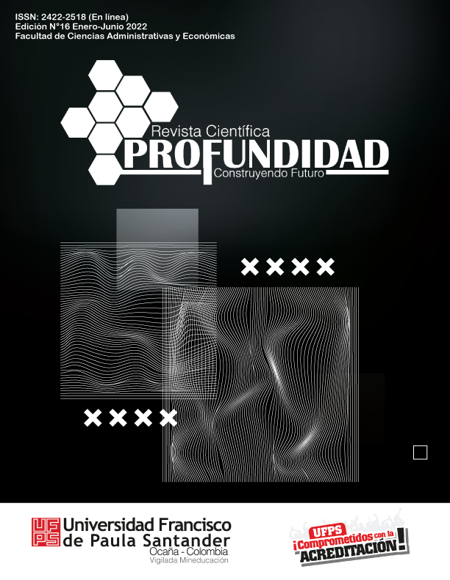Perspectives of distance university students against the impact of the Covid-19 phenomenon: Information for decision making
Perspectivas de estudiantes universitarios a distancia ante el impacto del fenómeno del Covid-19: Información para la toma de decisiones
Main Article Content
The objective of this project was to learn about the perspectives of university students on distance education at the Universidad del Valle de Puebla and the Universidad Autónoma del Estado de Hidalgo, delving into the phenomenon during the confinement derived from the pandemic of COVID-19 in Mexico, knowing its characteristics, peculiarities and opportunities for improvement. To establish the objective, the mixed research paradigm with a descriptive cut was used, using the case study methodology in a total population of 660 participants from both institutions. The study was carried out between the months of December 2020 and January 2021, through the use of a questionnaire sent through Google Forms in which the perspectives and experiences of the students in the August - December 2020 semester were investigated in the teaching-learning process. The results obtained describe that the characteristics of the population, the equipment used and acquired in the distance education model, as well as the type of classes that were held allowed us to know that the situations presented were very similar and reflect aspects important to the decisión making.
Downloads
Article Details
Alfaro, Y. (2021). ¿Qué tan rápido es el internet en México comparado con el mundo? https://www.milenio.com/negocios/que-tan-rapido-es-el-internet-en-mexico
Álvarez, A.C. y Álvarez, V. (2018). Cómo organizar un estudio de caso. educ@upn.mx revista universitaria, (23).
Andrada, A. y Parselis, M. (2005). E-learning y Educación Superior: una mirada desde el aprendizaje colaborativo, la interdependencia de saberes y la gestión del conocimiento. Instituto de Comunicación Social, Periodismo y Publicidad.
Chaves, A. (2017). La educación a distancia como respuesta a las necesidades educativas del Siglo XXI. Revista academia y virtualidad, 10(1), http://dx.doi.org/10.18359/ravi.2241 DOI: https://doi.org/10.18359/ravi.2241
Delgado, M., Arrieta, X., y Riveros, V. (2009). Uso de las TIC en educación, una propuesta para la optimización. Omnia, 15(3), 58-77.
Escalona, A. (2011). La investigación cualitativa: una alternativa para investigar en el ámbito educativo. Educare, 15 (1), 151-165.
García, L. (2017). Educación a distancia y virtual: calidad, disrupción, aprendizajes adaptativo y móvil. RIED Revista Iberoamericana de Educación a Distancia, 20 (2), 9-25. DOI: https://doi.org/10.5944/ried.20.2.18737
García, L. (2020). Bosque semántico: ¿educación/enseñanza/aprendizaje a distancia, virtual, en línea, digital, eLearning? RIED Revista Iberoamericana de Educación a Distancia, 23(1), 9-28. DOI: https://doi.org/10.5944/ried.23.1.25495
Huapaya, C.R., Arona, G.M. y Lizarralde, F.A. (2005). Enseñanza de la ingeniera con sistemas Tutoriales Inteligentes. Información Tecnológica, 16(5), 75-78. DOI: https://doi.org/10.4067/S0718-07642005000500012
Jiménez, V.E. (2016). Los estudios de caso como enfoque metodológico. ACADEMO Revista de investigación en Ciencias Sociales y Humanidades, 3(2).
Otzen, T. y Manterola, C. (2017). Técnicas de muestreo sobre una población a estudio. Int. J. Morphol, 35(1), 227- 232. DOI: https://doi.org/10.4067/S0717-95022017000100037
Pérez-López, E., Vázquez, A. y Cambero, S. (2021). Educación a distancia en tiempos de COVID-19: Análisis desde la perspectiva de los estudiantes universitarios. RIED, Revista Iberoamericana de Educación a Distancia, 24(1), 331-350. http://dx.doi.org/10.5944/ried.24.1.27855 DOI: https://doi.org/10.5944/ried.24.1.27855
Stake, R.E. (2005). Investigación con estudio de casos. Morata.
UNESCO IESALC. (2020). Covid-19 y educación superior: de los efectos inmediatos al día después. Análisis de impactos, respuesta y recomendaciones. UNESCO. http://www.iesalc.unesco.org/wp-content/uploads/2020/04/COVID-19-060420-ES-2.pdf
Valencia-Molina, T., Sema-Collazos, A., Ochoa-Angrino, S., Caicedo-Tamayo, A., Montes-González, J., y Chávez-Vescance, J. (2016). Competencias y estándares TIC desde la dimensión pedagógica: Una perspectiva desde los niveles de apropiación de las TIC en la práctica educativa docente. http://www.unesco.org/new/fileadmin/MULTIMEDIA/FIELD/Santiago/pdf/Competencias-estandares-TIC.pdf










